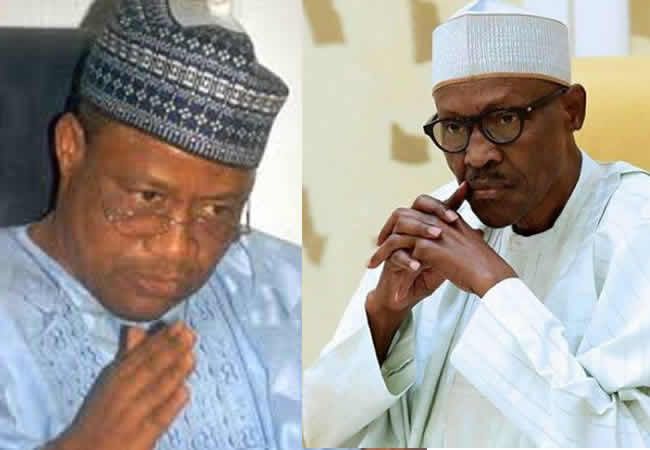
Former military head of state, Ibrahim Badamasi Babangida (IBB), says overthrowing General Muhammadu Buhari's regime in 1985 was justified.
IBB was Buhari's Chief of Army Staff after the latter emerged as a leader following the December 31, 1983 coup that ousted the civilian government headed by former President Shehu Shagari.
Meanwhile, on August 27, 1985, Babangida led the coup that overthrew his boss and made him the leader of the government until 1993.
In his memoir, ‘A Journey In Service,’ launched in Abuja last Thursday, IBB explained why the Buhari regime had to be thrown out, revealing that he was dissatisfied with the latter’s policies and leadership styles.
He noted that Buhari's regime promulgated “draconian” laws, causing the abuse of fundamental rights and freedoms of the citizens.
He expressed conviction that the policies of Buhari and his deputy, Tunde Idiagbon, “were detrimental to the nation’s progress,” and his dissatisfaction “eventually led to its ouster in 1985.”
ALSO READ: I needed to save the nation - IBB justifies killing his boyhood friend Vatsa
“After the military coup that replaced the civilian government of Shehu Shagari with a military regime led by Major General Muhammadu Buhari, Ibrahim Babangida assumed the role of Chief of Army Staff. However, he became increasingly dissatisfied with the Buhari government’s policies and leadership style, which he believed were detrimental to the nation’s progress. This dissatisfaction eventually led to its ouster in 1985, and he took office as the military President,” the book reads.
IBB narrates the journey to the seat of power in Lagos
Recalling his journey from Minna, Niger State capital, to assume office in Lagos on August 27, 1985, the former military ruler claimed that tension had already begun to build up since the inception of the year, making a change in leadership inevitably necessary.
He further stated that the coup which brought Buhari into office, which he tagged a “rescue mission,” had derailed with the military at the risk of splitting.
“On that day, it became my lot to step into the saddle of national leadership on behalf of the Nigerian armed forces. The change in leadership had become necessary as a response to the worsening mood of the nation and growing concern about our future as a people. All through the previous day, as we flew from Minna and drove through Lagos towards Bonny Camp, I was deeply reflecting on how we as a nation got to this point and how and why I found myself at this juncture of fate,” he wrote in the book.
“By the beginning of 1985, the citizenry had become apprehensive about the future of our country. The atmosphere was precarious and fraught with ominous signs of clear and present danger. It was clear to the more discerning leadership of the armed forces that our initial rescue mission of 1983 had largely miscarried. We now stood the risk of having the armed forces split down the line because our rescue mission had largely derailed. If the armed forces imploded, the nation would go with it, and the end was just too frightening to contemplate.
ALSO READ: You haven't said anything new about June 12 - MKO's daughter tackles Babangida
“Divisions of opinion within the armed forces had come to replace the unanimity of purpose that informed the December 1983 change of government. In state affairs, the armed forces, as the only remaining institution of national cohesion, were becoming torn into factions; something needed to be done lest we lose the nation itself. My greatest fear was that division of opinion and views within the armed forces could lead to factionalisation in the military. If allowed to continue and gain root, grave dangers lay ahead.”
Babangida slams Buhari and Idiagbon
The former military dictator claimed that Buhari and Idiagbon “posited a ‘holier than thou’ attitude,” isolating others from what was meant to be a collective leadership.
He noted that the duo caused the nation to become antagonistic towards the military.
“Fundamental rights and freedoms were being routinely infringed upon and abused. As a military administration, we were now presiding over a society that was primarily frightened of us.
“We were supposed to improve their lives and imbue the people with hope for a better future. Instead, we ruled the nation with a series of draconian decrees. An administration intended to reflect the collective will of the armed forces as a national institution came to be seen as the private personal autocracy of a stubborn few.
“Draconian decrees led to the abuse and severe limitation of basic freedoms as people were clamped into indefinite detention, most times for minor infractions. Punishment for crimes against the state had led to the pursuit of mechanical legalistic justice against the dictates of natural justice. As the Chief of Army Staff, I was under undue pressure from the rank and file to seek ways of reconnecting the government to society lest we lose the nation itself.
ALSO READ: Babangida: 'I offered Abiola interim govt, but he rejected it'
“This tense atmosphere culminated in the unanimous decision of a broad spectrum of senior and middle-level officers to change the nation’s leadership. The processes associated with this change were completed without bloodshed by midnight on August 26, 1985,” he added.